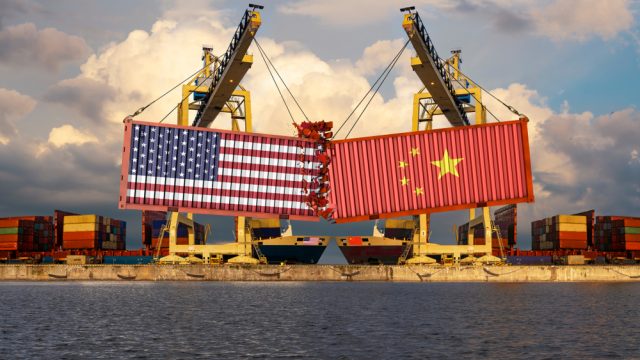The ongoing tariff war between the United States and China is expected to have significant spillover effects on Nigeria’s economy, potentially worsening the country’s trade deficit with China. Analysts at Meristem Securities highlight the risks of increased imports, capital flight, and currency depreciation, urging Nigeria to brace for economic challenges as global trade tensions escalate.
The tariff war between the United States and China is set to have far-reaching consequences for Nigeria’s economy, with analysts warning of a widening trade deficit and increased pressure on the naira. According to Meristem Securities’ latest macroeconomic update, titled ‘The US Tariff Hikes and Its Expected Impacts,’ the trade tensions could redirect more Chinese exports toward Nigeria, exacerbating the existing trade imbalance between the two countries.
The Donald Trump administration’s imposition of a 25 per cent tariff on imports from Canada and Mexico, along with a 10 per cent tariff on Chinese goods, has triggered a series of retaliatory measures from China. These include a formal complaint with the World Trade Organisation, a ban on exports of five major metals to the US, and a 15 per cent import tax on US coal, liquefied natural gas, and cars.
For Nigeria, which relies heavily on imports from China, these developments could spell trouble. Data from the National Bureau of Statistics (NBS) reveals that China accounted for 24.36 per cent of Nigeria’s imports in Q3 2024. As of Q3 2023, the trade deficit between Nigeria and China stood at N7.54 trillion, and analysts fear this gap could widen further.
Meristem analysts explained, “With the potential redirection of more exports toward Nigeria, imports from key trading partners, particularly China, could rise further, exacerbating Nigeria’s existing trade imbalance. This could widen the trade deficit, which already stood at N7.52 trillion with China. A sustained increase in import inflows without a corresponding rise in exports may place additional pressure on Nigeria’s external reserves, heightening currency depreciation risks and worsening trade imbalances over the medium term.”
The tariff war could also impact capital inflows into Nigeria. With the possibility of rising inflation in the US and a stronger US dollar, the Federal Reserve may maintain higher interest rates for an extended period. This could lead to capital flight from emerging markets like Nigeria, as investors seek safer havens offering attractive returns and the appeal of a stronger currency.
“Increased domestic production in the US could boost demand for the US dollar, further strengthening the currency in global markets. A stronger dollar would raise the cost of imports for Nigeria, exerting additional pressure on the naira and potentially accelerating its depreciation,” the analysts noted. This scenario could undermine the Central Bank of Nigeria’s efforts to stabilise the currency, leading to renewed foreign exchange volatility.
The fixed-income market is also at risk. Persistently higher interest rates in advanced economies could reduce capital inflows into Nigeria’s fixed-income market, while attractive rates abroad might encourage capital outflows. This could lead to rising bond yields as prices decline, further complicating Nigeria’s economic outlook.
Despite these challenges, the Chinese Ambassador to Nigeria, Yu Dunhai, remains optimistic about bilateral relations. Speaking at the 2025 Chinese Lunar New Year celebration in Abuja, Dunhai revealed that trade volume between Nigeria and China exceeded $20 billion in 2024. He described Nigeria as China’s largest engineering contract market, second-largest exporting market, and third-largest trade partner in Africa.
Dunhai highlighted the elevation of bilateral relations to a comprehensive strategic partnership during President Bola Tinubu’s visit to China, expressing confidence that 2025 would be even more successful for both countries.
As the US-China tariff war intensifies, Nigeria faces significant economic challenges, including a widening trade deficit, currency depreciation, and reduced capital inflows. While the country’s trade relationship with China remains robust, analysts urge policymakers to adopt measures to mitigate the spillover effects of global trade tensions. By addressing these risks, Nigeria can navigate the complexities of the evolving global trade landscape and safeguard its economic stability.
Follow us on Instagram.
https://www.instagram.com/businessnewsng?igsh=ZXpweTdjOGF1ZXdu

























